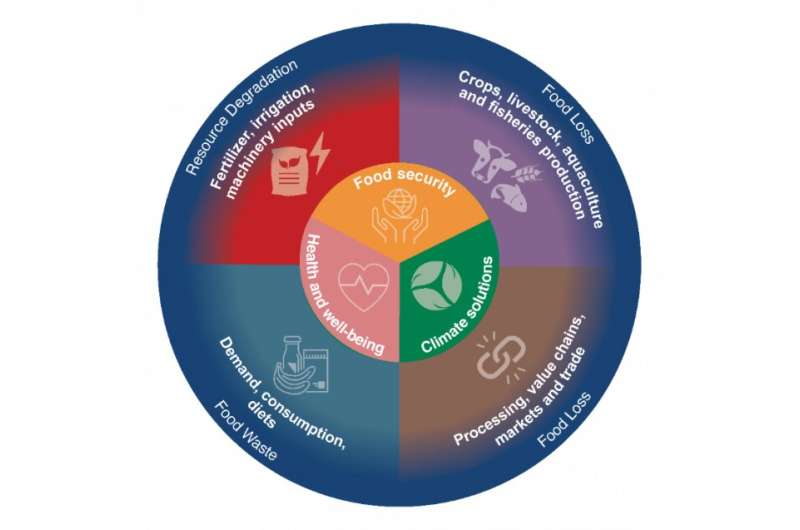Focus on food would help solve climate change, says study

A paper released today by the journal Nature Food presents a new global food system approach to climate-change research that brings together agricultural production, supply chains and consumption. When these activities are considered together, they represent 21 to 37 percent of total human-caused greenhouse gas emissions, the paper notes. It says that the new approach would enable a fuller assessment of the vulnerability of the global food system to increasing droughts, intensifying heatwaves, heavier downpours and coastal flooding. Food system responses thus could play a major role in both adapting to and mitigating climate change, the authors assert.
The authors of the paper worked together on the Food Security chapter of the recent Intergovernmental Panel on Climate Change Special Report on Climate Change and Land. They work with a wide range of food systems from around the world, from major commodity and livestock producers to smallholder farming systems.
"The global food system approach represents a significant advance in helping producers and consumers plan effective and well-integrated climate change responses," said Cynthia Rosenzweig, the lead author and head of the Climate Impacts Group at the NASA Goddard Institute for Space Studies and Columbia University's Center for Climate Systems Research.
"This approach brings into focus the emissions from all relevant food system activities, both within and outside the farm gate. In doing so, it breaks down the artificial separation between agriculture and related land use activities, such as deforestation, in country reports to the U.N. Climate Convention," said Francesco Tubiello, an author of the paper and a senior U.N. Food and Agriculture Organization officer. Concurrent with the paper, FAO is releasing new emission statistics for 1990-2017 that provide the shares of agriculture and related land use in total emissions from all economic sectors, for all countries.
"To address sustainable development and climate challenges, the food system approach helps countries implement a range of context-specific responses on adaptation and mitigation," said Cheikh Mbow, one of the coauthors and director of Future Africa.
"Diversification of the food system by establishing integrated production systems and broad-based genetic resources can reduce risks from climate change," said Murukesan Krishnapillai, one of the coauthors and research scientist with the College of Micronesia-FSM. "This is particularly important for smallholder farmers, who are among the most vulnerable to the effects of climate change," added Erik Mencos Contreras, staff officer of research at Columbia University's Center for Climate Systems Research and also a coauthor.
To respond to climate change via their food systems, countries can now move beyond supply-side mitigation in crop and livestock production, which has been the traditional approach, to encompass demand-side strategies, mainly dietary changes, say the authors. Plant-based diets reduce emissions of methane, a powerful greenhouse gas released by ruminants. They also require less land, thus sparing areas that can be used to plant trees and store more carbon. When both these effects are combined, the maximum amount of greenhouse gas reduction achievable through dietary change is up to 8 billion metric tons of CO2 per year, say the authors.(Total anthropogenic emissions are currently about 52 billion metric tons per year.)
Healthy, low-emission diets that are primarily plant-based can also reduce the burden of key non-communicable ailments, such as heart disease and diabetes, say the authors.
"Reducing food loss and waste from across the entire food chain can now be considered as well, which can lead to opportunities for food systems to engage in the circular economy," said Mario Herrero, chief research scientist of agriculture and food at Australia's Commonwealth Scientific and Industrial Research Organisation and a coauthor of the paper.
"This approach reveals several synergies in response options across food systems, bringing co-benefits to livelihoods and biodiversity. And in this way, these responses also help to achieve the Sustainable Development Goals," said Prajal Pradhan, a coauthor and an agro-ecologist at Germany's Potsdam Institute for Climate Impact Research. For example, increasing soil organic matter can help sequester carbon and enhance resilience to drought, as well as boost productivity and soil biodiversity, he said.
More information: Cynthia Rosenzweig et al. Climate change responses benefit from a global food system approach, Nature Food (2020). DOI: 10.1038/s43016-020-0031-z
Journal information: Nature Food
Provided by Earth Institute, Columbia University
This story is republished courtesy of Earth Institute, Columbia University http://blogs.ei.columbia.edu.




















